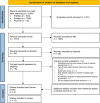The link between psychological distress and survival in solid tumor patients: A systematic review
- PMID: 36602400
- PMCID: PMC9939126
- DOI: 10.1002/cam4.5200
The link between psychological distress and survival in solid tumor patients: A systematic review
Abstract
Purpose: Research has demonstrated that solid tumor patients experience high levels of psychological distress at the time of diagnosis. While distress has been associated with many adverse clinical outcomes, little is known about how this symptom may influence the disease trajectory for cancer patients, affecting outcomes such as progression, recurrence, and survival. The purpose of this systematic review was to explore the literature linking distress with survival in solid tumor patients, which may guide future work exploring clinical outcomes as a function of distress.
Methods: A systematic search of PubMed, Embase, and Web of Science was performed using PRISMA (Preferred Reporting Items for Systematic Reviews and Meta-Analyses) guidelines with predefined eligibility criteria. Thirteen studies met the inclusion criteria and were selected for review.
Results: Findings from this review demonstrated a weak-to-moderate relationship between cancer patients' experience of distress and overall survival, with most included studies (11/13) finding at least one predictive analysis to be significant when controlling for confounders. However, significant heterogeneity in the literature, particularly with study sample characteristics and varying methodologies, made direct comparisons across studies challenging.
Conclusion: Findings from this review suggest that psychological distress may have an impact on disease-related outcomes, including (but not limited to) survival. Future work should consider performing disease-specific analyses controlling for key prognostic factors to better understand the nuanced relationship between distress and clinical outcomes, which may allow further understanding of the biological underpinnings of this relationship and enable the development of targeted interventions for improving distress.
Keywords: cancer; distress; patient-reported outcomes; survival; tumors.
© 2023 The Authors. Cancer Medicine published by John Wiley & Sons Ltd.
Conflict of interest statement
The authors have no conflicts of interest to disclose.
Figures



References
-
- Zabora JR, Blanchard CG, Smith ED, et al. Prevalence of psychological distress among cancer patients across the disease continuum. J Psychosoc Oncol. 1997;15:73‐87.
-
- Pirl WF, Fann JR, Greer JA, et al. Recommendations for the implementation of distress screening programs in cancer centers: report from the American psychosocial oncology society (APOS), Association of Oncology Social Work (AOSW), and Oncology Nursing Society (ONS) joint task force. Cancer. 2014;120:2946‐2954. - PubMed
-
- Healthy Lifestyle Stress Management: Chronic stress puts your health at risk. Mayo Foundation for Medical Education and Research. Accessed December 19, 2022. https://www.mayoclinic.org/healthy‐lifestyle/stress‐management/basics/st...
-
- Page MJ, McKenzie JE, Bossuyt PM, et al. The PRISMA 2020 statement: an updated guideline for reporting systematic reviews. Rev Esp Cardiol (Engl ed). 2021;74:790‐799. - PubMed
Publication types
MeSH terms
LinkOut - more resources
Full Text Sources
Medical
Miscellaneous

